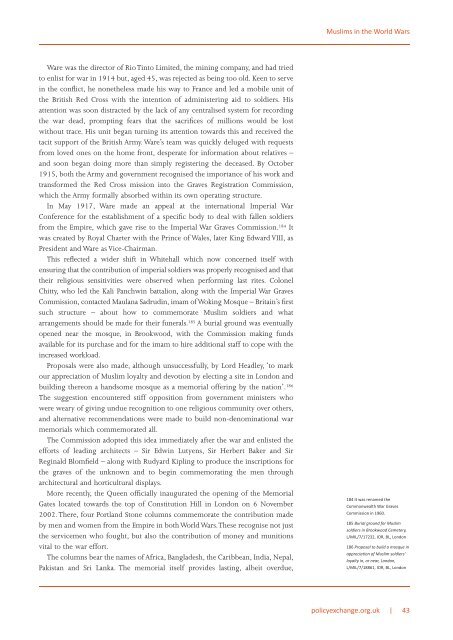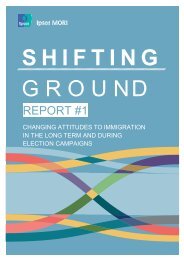Create successful ePaper yourself
Turn your PDF publications into a flip-book with our unique Google optimized e-Paper software.
Ware was the director of Rio Tinto Limited, the mining company, and had tried<br />
to enlist for war in 1914 but, aged 45, was rejected as being too old. Keen to serve<br />
in the conflict, he nonetheless made his way to France and led a mobile unit of<br />
the British Red Cross with the intention of administering aid to soldiers. His<br />
attention was soon distracted by the lack of any centralised system for recording<br />
the war dead, prompting fears <strong>that</strong> the sacrifices of millions would be lost<br />
without trace. His unit began turning its attention towards this and received the<br />
tacit support of the British Army. Ware’s team was quickly deluged with requests<br />
from loved ones on the home front, desperate for information about relatives –<br />
and soon began doing more than simply registering the deceased. By October<br />
1915, both the Army and government recognised the importance of his work and<br />
transformed the Red Cross mission into the Graves Registration Commission,<br />
which the Army formally absorbed within its own operating structure.<br />
In May 1917, Ware made an appeal at the international Imperial War<br />
Conference for the establishment of a specific body to deal with fallen soldiers<br />
from the Empire, which gave rise to the Imperial War Graves Commission. 184 It<br />
was created by Royal Charter with the Prince of Wales, later King Edward VIII, as<br />
President and Ware as Vice-Chairman.<br />
This reflected a wider shift in Whitehall which now concerned itself with<br />
ensuring <strong>that</strong> the contribution of imperial soldiers was properly recognised and <strong>that</strong><br />
their religious sensitivi<strong>ties</strong> were observed when performing last rites. Colonel<br />
Chitty, who led the Kali Panchwin battalion, along with the Imperial War Graves<br />
Commission, contacted Maulana Sadrudin, imam of Woking Mosque – Britain’s first<br />
such structure – about how to commemorate Muslim soldiers and what<br />
arrangements should be made for their funerals. 185 A burial ground was eventually<br />
opened near the mosque, in Brookwood, with the Commission making funds<br />
available for its purchase and for the imam to hire additional staff to cope with the<br />
increased workload.<br />
Proposals were also made, although unsuccessfully, by Lord Headley, ‘to mark<br />
our appreciation of Muslim loyalty and devotion by electing a site in London and<br />
building thereon a handsome mosque as a memorial offering by the nation’. 186<br />
The suggestion encountered stiff opposition from government ministers who<br />
were weary of giving undue recognition to one religious community over others,<br />
and alternative recommendations were made to build non-denominational war<br />
memorials which commemorated all.<br />
The Commission adopted this idea immediately after the war and enlisted the<br />
efforts of leading architects – Sir Edwin Lutyens, Sir Herbert Baker and Sir<br />
Reginald Blomfield – along with Rudyard Kipling to produce the inscriptions for<br />
the graves of the unknown and to begin commemorating the men through<br />
architectural and horticultural displays.<br />
More recently, the Queen officially inaugurated the opening of the Memorial<br />
Gates located towards the top of Constitution Hill in London on 6 November<br />
2002. There, four Portland Stone columns commemorate the contribution made<br />
by men and women from the Empire in both World Wars. These recognise not just<br />
the servicemen who fought, but also the contribution of money and munitions<br />
vital to the war effort.<br />
The columns bear the names of Africa, Bangladesh, the Caribbean, India, Nepal,<br />
Pakistan and Sri Lanka. The memorial itself provides lasting, albeit overdue,<br />
Muslims in the World Wars<br />
184 It was renamed the<br />
Commonwealth War Graves<br />
Commission in 1960.<br />
185 Burial ground for Muslim<br />
soldiers in Brookwood Cemetery,<br />
L/MIL/7/17232, IOR, BL, London<br />
186 Proposal to build a mosque in<br />
appreciation of Muslim soldiers’<br />
loyalty in, or near, London,<br />
L/MIL/7/18861, IOR, BL, London<br />
policyexchange.org.uk | 43



